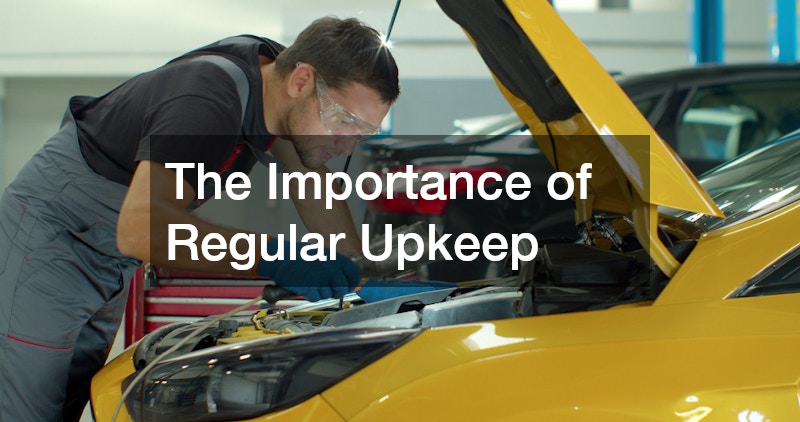Keeping your car in excellent condition doesn’t have to be complicated. Whether you drive every day or just on weekends, taking time to maintain your vehicle saves money, prevents unexpected repairs, and extends your car’s life. This guide covers everything you need to know to keep your ride running smoothly—inside, outside, and under the hood.
The Importance of Regular Upkeep

A car is one of your biggest investments, and like any valuable item, it needs attention. Ignoring small issues can quickly lead to expensive repairs or even safety risks. Regular care ensures better fuel economy, smoother performance, and a more comfortable driving experience. By staying proactive instead of reactive, you’ll reduce stress, save time, and keep your car looking and feeling new for years.
Routine Care That Prevents Bigger Problems
One of the best ways to keep your car running smoothly and avoid costly repairs is by sticking to a regular vehicle maintenance schedule. Preventive care helps your car perform efficiently, saves fuel, and extends its overall lifespan. Simple tasks like oil changes, air filter replacements, tire rotations, and brake inspections might seem small, but they play a huge role in protecting key components from premature wear.
Routine maintenance also gives professionals the chance to catch potential issues early before they become serious. For example, uneven tire wear can point to alignment problems, while low fluids may indicate leaks in your system. Ignoring these early signs can lead to breakdowns or expensive repairs down the line.
Following your manufacturer’s maintenance guidelines ensures that every part of your car—engine, transmission, brakes, and suspension—works in sync. It’s also a great way to maintain warranty coverage and resale value. Consistent upkeep not only improves reliability but also builds confidence, knowing your vehicle is safe and ready for any drive. Whether you commute daily or use your car occasionally, regular maintenance is the simplest and smartest investment for long-term performance.
Choosing a Reliable Option When Buying Secondhand
If you’re in the market for a pre-owned vehicle, selecting the right used cars requires patience and careful inspection. It’s easy to be swayed by a shiny exterior or low price, but what truly matters is what’s beneath the surface.
Before purchasing, have the car inspected by a trusted mechanic. Review maintenance records, check for signs of accidents or rust, and take it for a thorough test drive. Reliable sellers will provide a vehicle history report to confirm details about previous ownership and any reported damage. Doing your research upfront can save you thousands in unexpected repairs later.
Fixing Small Dents Without a Full Paint Job
Minor dents and dings are an inevitable part of car ownership, whether caused by hail, parking lot mishaps, or stray shopping carts. Fortunately, modern paintless dent repair techniques make it possible to restore your vehicle’s exterior without the need for expensive repainting or fillers. This method keeps your car’s original paint intact, preserving both its appearance and resale value.
Skilled technicians use precision tools to carefully massage the metal back into place from behind the affected panel. The process requires experience and a delicate touch but delivers excellent results—most small dents can be repaired in just a few hours. Because it avoids paintwork and sanding, it’s also environmentally friendly and more affordable than traditional body repair methods.
Choosing paintless dent repair not only saves time and money but also maintains your vehicle’s structural integrity. It’s an ideal option for cosmetic damage that hasn’t cracked the paint, offering a quick, effective way to keep your car looking new. For busy drivers who care about aesthetics and value, this modern repair approach provides an easy path to a flawless finish without the hassle of a full repaint.
Seeing Clearly on the Road
Clear visibility is one of the most important factors in safe driving, yet it’s often overlooked until a problem arises. Even small chips or cracks can obstruct your view or weaken your car’s windshield, especially when exposed to temperature changes or vibrations. That’s why timely windshield replacement is critical for both safety and comfort.
Professional technicians use precision tools and high-quality glass to ensure the new windshield fits perfectly and seals securely. This proper installation prevents leaks, wind noise, and structural weakness. Modern vehicles often have advanced features—like lane departure warnings, rain sensors, and defogging technology—integrated into the windshield, so accurate calibration during replacement is essential for those systems to function correctly.
Addressing windshield damage early not only restores clear visibility but also helps maintain your car’s overall strength in case of a collision. A secure windshield supports the roof structure and airbag deployment, playing a crucial role in passenger protection. Regularly inspecting and caring for your car’s glass is a simple yet powerful habit that enhances driving safety and extends your vehicle’s lifespan—ensuring you always see the road ahead with confidence.
What to Do if Your Car Gets Towed

Unexpected situations can happen to any driver, from parking violations to breakdowns. Understanding how impound services work can make these stressful moments more manageable. If your car gets towed, the first step is to find out which company has your vehicle. Local authorities or property managers can usually provide that information.
Once located, you’ll need to bring identification, proof of ownership, and payment for any fees before your car is released. Staying calm and organized during the process prevents delays and ensures you get your car back quickly. Keeping emergency contact numbers on hand is always a smart move.
The Foundation of a Smooth Ride
No part of your car affects performance and safety more than your tires. They connect your vehicle to the road, influencing handling, fuel efficiency, and braking distance. Regularly check for signs of wear, bulges, or uneven tread patterns. Use a pressure gauge monthly to ensure each tire is inflated to the manufacturer’s recommended level.
Rotating your tires every 5,000 to 7,000 miles helps them wear evenly, while wheel alignment and balancing maintain a smooth, stable ride. Investing in quality tires and proper maintenance extends their life and keeps your car driving comfortably and safely.
Sustainability Through Responsible Disposal
Caring for your car also means caring for the planet. When your old vehicle or its components are no longer usable, working with a trusted auto recycling service is one of the most sustainable decisions you can make. Recycling keeps tons of metal, glass, and plastic out of landfills while reducing the demand for new raw materials. This helps lower energy use and carbon emissions tied to manufacturing new parts.
Auto recycling centers carefully dismantle vehicles, salvaging reusable materials like steel, aluminum, copper, and plastic components. Fluids such as oil, transmission fluid, and coolant are safely drained and repurposed or disposed of according to strict environmental regulations. Even batteries and tires are processed in ways that minimize ecological impact.
Choosing an ethical recycling service isn’t just about environmental responsibility—it can also offer practical benefits. Many facilities pay for old cars or scrap parts, helping offset repair or replacement costs. By recycling instead of discarding, you contribute to a circular economy that supports cleaner production and smarter resource management. It’s a simple, meaningful step toward sustainability that aligns your car care habits with long-term environmental stewardship.
Keeping Your Car Looking New
A clean car isn’t just about appearances—it also protects your paint and interior materials from damage. Regularly visiting a professional car washing service removes dirt, salt, and debris that can cause corrosion over time. In addition to exterior washing, consider interior detailing to keep your seats, dashboard, and carpets in top shape.
Professional washes often include wax or ceramic coatings that provide extra protection against UV rays and rain. Taking pride in your car’s cleanliness can also improve your driving experience—nothing beats that fresh, well-kept feeling every time you get behind the wheel.
Adding Comfort and Protection
Comfort and protection go hand in hand when it comes to driving, and few upgrades deliver both as effectively as vehicle tinting. Beyond its sleek appearance, window tint serves as a barrier against harsh sunlight, excessive heat, and damaging ultraviolet rays. It keeps the interior temperature cooler, reducing the need for constant air conditioning—an improvement that can enhance fuel efficiency and preserve your car’s energy use over time.
Professionally installed tinting also helps protect your interior materials, preventing fading and cracking on dashboards, seats, and trim caused by prolonged sun exposure. In addition to comfort and preservation, tinting improves safety by reducing glare from headlights and the sun, allowing for better visibility and concentration on the road.
Privacy is another welcome benefit. Window tint limits how much outsiders can see inside your vehicle, safeguarding valuables and offering peace of mind when parked. With various shades and materials available, you can choose a tint level that aligns with both your local regulations and personal style. Overall, it’s a cost-effective enhancement that elevates driving comfort, maintains a cooler cabin, and adds an extra layer of protection for both you and your car.
Knowing When to Call in the Experts
Even the most diligent car owners encounter mechanical issues that require a professional touch. Finding a trusted auto repair service is key to maintaining your vehicle’s performance and safety. Look for certified technicians who specialize in your car’s make and model, and read reviews to ensure quality workmanship.
Common signs that you need expert help include unusual noises, fluid leaks, or dashboard warning lights. A good repair shop will communicate clearly, provide written estimates, and explain any recommended services before starting work. Building a relationship with a reliable mechanic saves time, money, and worry down the road.
Small Habits That Make a Big Difference
Car care doesn’t always require major effort or expense. Often, it’s the small habits that make the biggest difference:
-
Clean out your car weekly. Clutter can hide spills and damage materials.
-
Check your oil and coolant regularly. Fluids are the lifeblood of your car.
-
Park in shaded areas when possible. This reduces sun damage to paint and interiors.
-
Listen for unusual sounds. They often signal problems before they worsen.
-
Follow your owner’s manual. It’s your roadmap for proper maintenance schedules.
By building these habits into your routine, you’ll naturally extend your car’s lifespan and keep it performing at its best.
Staying Prepared for the Unexpected
Even with excellent maintenance, things can still go wrong—flat tires, dead batteries, or sudden weather changes. Keep an emergency kit in your trunk with essentials such as:
-
Jumper cables
-
Tire repair kit or spare tire
-
First-aid supplies
-
Flashlight and batteries
-
Water and non-perishable snacks
Preparation brings peace of mind. It ensures that even when life throws a curveball, you’ll be ready to handle it calmly and safely.
The Payoff of Consistent Care
Caring for your car consistently goes beyond avoiding expensive repairs—it’s about peace of mind and confidence every time you turn the key. A well-maintained vehicle performs better, lasts longer, and keeps you safer on the road. Routine checkups, fluid replacements, and inspections might seem small, but together they prevent breakdowns, improve fuel efficiency, and extend the life of essential components.
When you commit to steady upkeep, you also protect your car’s resale value. Buyers are far more likely to pay top dollar for a vehicle with detailed maintenance records and a spotless history. Beyond the financial benefits, consistent care helps reduce stress—you won’t have to worry about last-minute mechanical failures or costly surprises before important trips.
Regular attention to your vehicle also reflects pride and responsibility. It shows that you value reliability and safety, not just convenience. Moreover, a well-tuned car emits fewer pollutants, supporting a cleaner environment. Whether it’s a quick wash, a scheduled service, or timely repairs, every bit of care contributes to smoother rides and longer vehicle life. The small investments you make today will return years of dependable, worry-free driving tomorrow.
Final Thoughts
Keeping your car in top shape is a blend of consistency, knowledge, and care. Regular maintenance, cleanliness, and professional support all play crucial roles in preserving performance, comfort, and safety. When you stay proactive—checking fluids, replacing worn parts, and handling repairs promptly—you’re not just maintaining a machine; you’re ensuring a smoother, safer, and more enjoyable driving experience every day.
Your vehicle works hard for you—make sure you give it the care it deserves.

